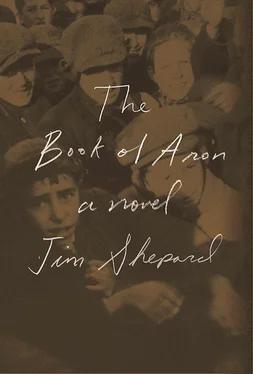“Gentlemen, it’s been a long day,” Korczak told them. Madame Stefa stepped over and put an arm on his shoulder.
“And now he’s crying,” Boris said to the boy about me, as though he’d predicted it. I put my fists atop my head as if that would help.
The Jews could fight better than anyone knew, the boy said. He said there was an anti-aircraft post near Mława during the first days of the war when everyone else had run away during an air raid and the Jews had shot down seventeen planes. “Seventeen planes!” he said.
“You won’t go?” I asked Korczak. He looked away.
“Make yourself useful,” Boris finally said to me.
“Make up for what you’ve done,” the other boy said.
“I’ve never been useful,” I told them. “And I can’t make up for what I’ve done.”
They both stared at me. “I never thought he’d help,” Boris said, pointing at Korczak. “But I thought you might.”
The other boy looked at me with hatred. “We have no chance without someone on the inside,” he said to Korczak. “Tell him that.”
“It’s his decision,” Korczak said.
Lice and bedbugs swarmed around on my head and chest. I raked my hands over them. “Can I take a day to think about it?” I asked.
“You don’t have a day,” the boy said.
“Then no,” I told him.
KORCZAK WENT UP TO HIS ROOM AFTER THEY LEFT and Madame Stefa followed him. I sat below in the dark with the sleeping kids until I couldn’t stand it anymore and climbed the stairs.
They were sitting together. He had pulled the blackout paper down from one of the windows and the sheets on all the beds gave off a pale light. The paper was still in his hand and when he crumpled it only a few of the sicker kids stirred.
“What a marvelous big moon over this camp of helpless pilgrims,” he said to himself. It was as sad as I’d ever seen him.
“I’m sorry,” I said from across the room.
He nodded. “Do you even understand why I’m so angry?” he said.
“I just wanted you to be safe,” I said. But he didn’t seem to have heard.
“Can I get you anything?” Madame Stefa asked him after a minute.
He shook his head. “Sit with us,” he said without looking at me, and patted the sheet.
I went past the other beds and sat at the foot of his next to Madame Stefa and after he laid down we did too, though our feet were still on the floor. We listened to his breathing.
“Did you know I met Madame Stefa on a trip to Switzerland when I was still a student?” he asked. I shook my head but he couldn’t see. She made an amused sound.
“I told her on our first meeting during a long exchange on a park bench that I was the son of a mental patient but was going to become the Karl Marx of children,” he said.
“Thank you,” I told him, “for calling me over.”
“She was very self-assured,” he said.
“I’m still self-assured,” she told him.
“She was eating an unripe pear,” he said, and she stretched an arm in his direction. I felt his knee under the sheet.
“Always at the back of your mind is the question of what you’ll do when they finally do come,” he said after we’d been lying there for a few minutes. He touched his glass and his cigarettes and then fell asleep.
WHEN HE WOKE UP I DID TOO AND HE PROPPED HIMSELF up on his elbows. It was early. Gieńa was in her nightshirt under the window. “Good morning,” he said to her.
“Good morning,” she said back.
“Smile,” he told her, and she did. He said that today he thought he’d like a breakfast of sausage, ham, and buns. Madame Stefa got to her feet and walked to the staircase and shouted “Boys! Breakfast! Get up!” and down below we could hear beds moved and the wooden tables pushed together and the pot being filled in the kitchen. Then there were two whistle blasts and men at the front and back doors shouted, “All Jews out! All Jews out!”
Gieńa put a hand to her mouth. Madame Stefa ran downstairs. Korczak struggled into his clothes and I followed him down once he’d stuffed his feet into his shoes.
Madame Stefa was in the main room trying to keep the kids calm. She shook some who were making too much noise. The Germans and Ukrainians were still shouting. Korczak looked out the kitchen window and saw something that made him pull me out the back door into the courtyard with him.
It was filled with men standing around: five or six SS, a line of Ukrainians, and two more of yellow police. The SS and Ukrainians were wearing long overcoats in the heat and sweating and yelling for water. Lejkin was bent over with his hands on his hips in front of his police. Korczak asked him what was happening and Lejkin told him to get everyone together. Korczak asked again and Lejkin repeated himself.
When Korczak told him he needed time to allow the children to pack up, Lejkin said that he had twenty minutes.
“Explain to him,” Korczak said to me. “Tell him that I need more time.”
“He needs more time,” I said to Lejkin.
Lejkin looked at me. “Ten minutes,” he said.
Korczak pushed back inside and clapped his hands for everyone’s attention. Madame Stefa and the other staff members worked on getting those who were most upset to listen to him. He asked two boys to close the doors and when some Ukrainians tried to stop them he shouted, “We still have five minutes,” so they allowed it.
Once the doors were shut the kids pushed forward as if whoever was closest to him would be the safest. I pushed forward myself. I was so panicked I was just calling, “Pan Doctor! Pan Doctor!” Mietek held my shirttail to keep his position. His head was so full of lice it was like he had gray hair.
Korczak said it had been claimed this home was so filled with the well-behaved that at times you wouldn’t know there was a child in the house. He said his mother had told him he had no ambition because it always had been the same to him whether he played with his own kind or the janitor’s children and that there was no one with whom he would rather undertake what we were all about to do. He said where we were going there’d be no card playing, no sunbathing, and no rest. When some of the kids made noises he said he was telling us this because he’d spent his entire life demanding respect for the child and it was time to practice what he preached. More kids made noise and he quieted them with a hand gesture. He said not to forget that Moses himself had been a child under a death sentence. He told everyone of a time he’d convinced Jerzyk not to cover some ants with dirt. And who knows, he said: maybe even now those ants were back at their home, telling the story of how they survived.
He told us to arrange ourselves in lines of four and the staff members helped. It took all of the time we had left. The doors burst open before we were finished and the shouting started again.
Korczak waited for it to stop and then said he was already so proud of us that his heart was bursting. And who was to say that if anyone had a chance of surviving it couldn’t be us? And he said he’d use his old magic, we would see, to wheedle bread and potatoes and medicine for everyone. And that he’d be with us for whatever lay ahead.
Madame Stefa was holding one of the sicker five-year-olds, and handed another to Korczak. He hefted her in front of everyone and said Romcia would be our standard-bearer. Along with Jerzyk who had spared the ants. He asked one of the staff to hand Jerzyk the bright-green flag with the Jewish star and two older kids helped him with the harness.
Mietek was still in his rotten boots with his dead brother’s prayer book. Abrasha with his eyebrow had his violin in its case. Zygmuś was bare-handed. Other kids held toys or cups. Most had put their caps on.
Читать дальше












